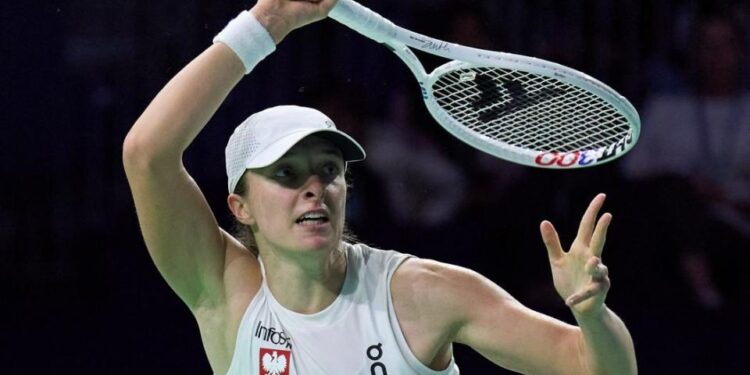
Iga Swiatek, the world No 2 and French Open champion, has accepted a one-month ban after testing positive for trimetazidine (TMZ), a banned substance.
In the second doping incident to rock the sport this year, the International Tennis Integrity Agency (ITIA) announced that the five-time major winner has eight days of a suspension left to serve.
The ITIA issued the ban after ruling that the player’s level of fault was at the lowest end of the range with “no significant fault or negligence” – effectively meaning the offence was unintentional. The drug appears to have been found in medication she was taking to treat jet lag.
Swiatek’s suspension is the second high-profile doping case in tennis this year. Top-ranked male player Jannik Sinner failed two tests for a steroid in March but was cleared in August, right before the start of the US Open, which he went on to win for his second major title of the season.
Secret suspension served earlier this year
Swiatek, who has spent more than 100 weeks as world No 1, will be eligible to play at the Australian Open in January. The 23-year-old from Poland tested positive for a trace concentration of TMZ, usually used as heart medication for its ability to enhance blood flow. The test was taken in an out-of-competition sample on August 12, before the Cincinnati Open.
Swiatek was informed of the positive test by the ITIA exactly one month later on September 12 and given a mandatory provisional suspension. That suspension had been kept secret until now.
“The player was provisionally suspended from Sept 22 until Oct 4, missing three tournaments, which counts towards the sanction, leaving eight days remaining,” the ITIA said in a statement.
Swiatek also recently parted ways with her coach of three years Tomasz Wiktorowski, replacing him with Wim Fissette. In her defence, Swiatek submitted hair samples along with supplements for testing, where it was found that a melatonin supplement to manage jet lag was the cause of the TMZ traces. An independent Wada-accredited lab commissioned by the ITIA further confirmed the results.
‘Situation nearly broke my heart’
In a video statement on Thursday, Swiatek said: “This experience, the most difficult in my life so far, taught me a lot. The whole thing will definitely stay with me for the rest of my life, it took a lot of strength, returning to training after this situation nearly broke my heart. So there were many tears and lots of sleepless nights.
“The worst part of it was the uncertainty. I didn’t know what was going to happen with my career, how things would end or if I would be allowed to play tennis at all,” she said.
Swiatek won the French Open in June and won a bronze medal at the Paris Olympics in August this year. She was ranked World No 1 for most of the past two seasons but is currently No 2 to Aryna Sabalenka.
She insisted in her video statement shared on Instagram that she had “never encountered” the drug she is accused of taking.
“I had a strong sense of injustice and the first few weeks [after the failed test] were really chaotic” she said. “The tests showed that melatonin I’ve been using for a long time – the batch I had on me and had used before the Cincinnati tournament – was contaminated during manufacturing.
“It was a shock to hear, but it also explained a lot and locating the source is key in these cases which is why after finding out we had to prove that the medication was in fact contaminated. Melatonin is necessary for me because of my travelling, jet lag and work-related stress mean sometimes without it I could not fall asleep. After finding the source we needed time for the whole matter to be concluded, which is happening now.”
WTA ‘fully supports Iga’
The Women’s Tennis Association also issued a statement, saying: “The WTA fully supports Iga during this difficult time. Iga has consistently demonstrated a strong commitment to fair play and upholding the principles of clean sport, and this unfortunate incident highlights the challenges athletes face in navigating the use of medications and supplements.
“The WTA remains steadfast in our support for a clean sport and the rigorous processes that protect the integrity of competition. We also emphasise that athletes must take every precaution to verify the safety and compliance of all products they use, as even unintentional exposure to prohibited substances can have significant consequences.
“We will continue to work closely with our athletes to provide education and resources that empower athletes to make informed decisions and maintain the highest standards of integrity in our sport.”







